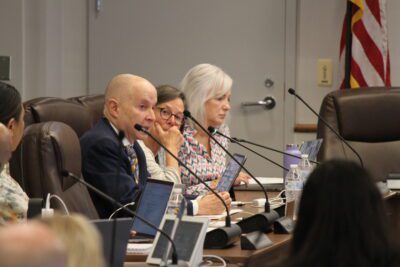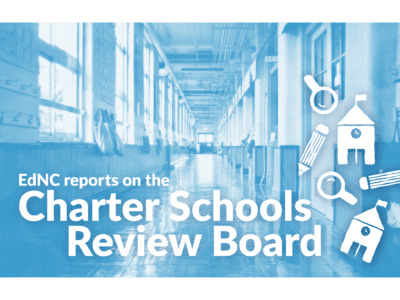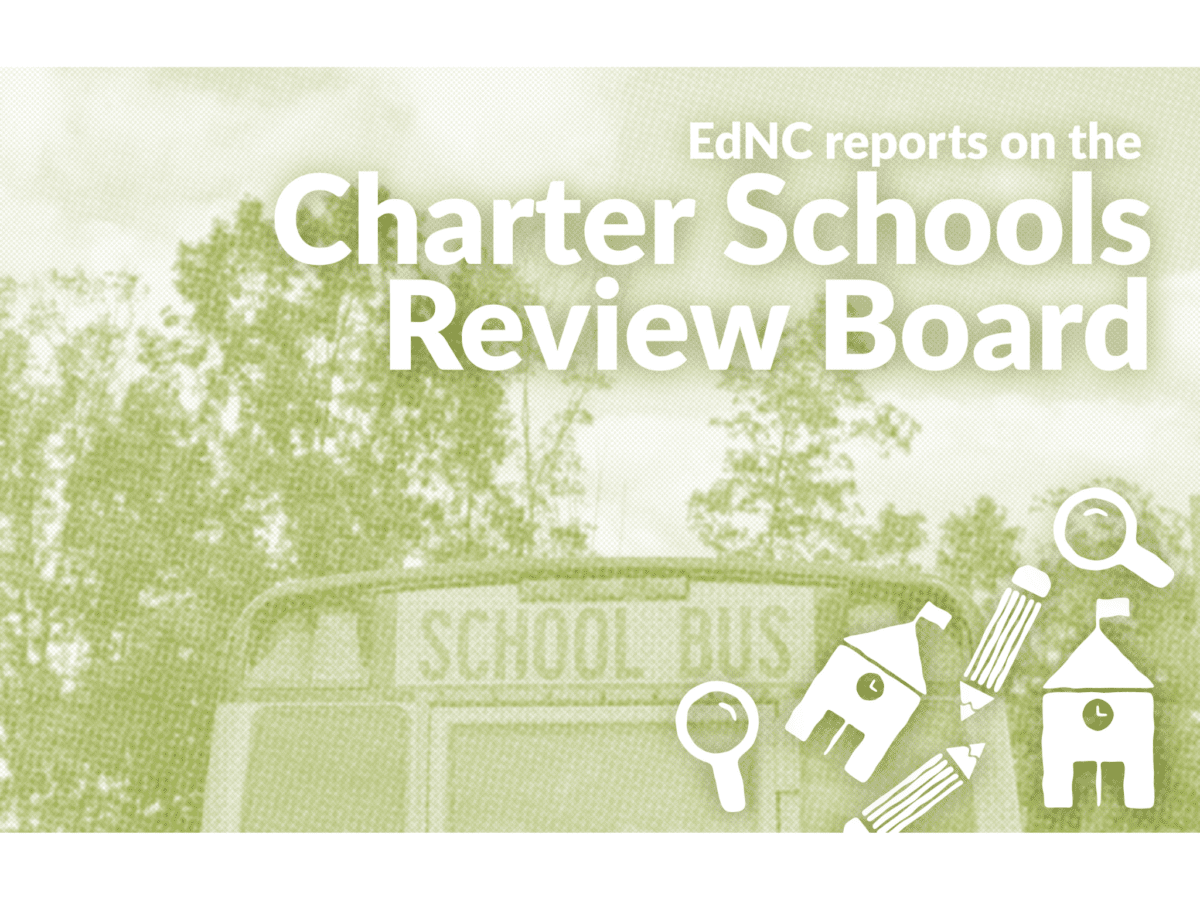
A Guilford County charter school is facing closure less than two months after opening its doors to students. Triad International Studies Academy (TISA) in High Point had its charter revoked by the Charter Schools Review Board (CSRB) due to under-enrollment on Monday, Oct. 6, the first of the CSRB’s two-day meeting.
With just 42 students, TISA fell short of the 80-student minimum specified in state statute. While the law permits lower enrollment for a “compelling reason,” CSRB members did not believe explanations presented by TISA leaders warranted an exemption.
Now, the school has until the end of December to close.
During discussion, CSRB members expressed disappointment over TISA’s enrollment predicament as well as leaders’ decision not to seek a delay.
“I hate to see that you guys are in the position even to have to be here today,” CSRB Vice Chair John Eldridge said.
“You just would have been in a much better place if you had just said we needed a year delay,” CSRB Chair Bruce Friend said. “You knew going in this summer that… the numbers just weren’t there.”
![]() Sign up for the EdDaily to start each weekday with the top education news.
Sign up for the EdDaily to start each weekday with the top education news.
During its October meeting, the CSRB also approved an accelerated Wake County applicant, Focus Academy Charter School, which plans to open in 2026. But the board denied two other applicants: Preparatory Leadership Academy in Gaston County and Encompass Montessori in Wake County. Both schools hoped to open in 2027.
In addition, CSRB members reviewed an academic report from the Office of Charter Schools (OCS) with new 2024-25 data, disaggregated to show charter performance. Similar to overall public school data released last month, charter figures revealed some encouraging news: 71% of charter schools earned a school performance grade of C or better.
Other metrics showed 29% of charters exceeded growth, while 44% met growth and 28% did not. The percentage of schools failing to meet growth is the lowest in several years, according to OCS.
More on TISA’s closure, and new school enrollment
School leaders from TISA appeared in person to request an enrollment exemption until fall 2026. During questioning, they cited renovation delays as a key challenge as well as an incident of student aggression at an open house that deterred families from enrolling.
Leaders said the school’s high population of exceptional children (EC) offered a compelling reason for an exemption. EC students comprise around one-third of TISA’s enrollment, which is a larger proportion than at most charter schools.
Chaowei Zhu, TISA’s board chair, sought to reassure the CSRB that TISA would be sustainable financially if the school could enroll 50 students, due to rent deferral, cost management, and other measures. In his presentation, Zhu also outlined plans to ramp up marketing efforts targeting enrollment.
CSRB members questioned TISA’s decision to move ahead with opening in the first place.
“Delays are unfortunate. Many of us have experienced that,” Friend said. “But as you got closer to the… opening day of school, and it was apparent you weren’t going to meet 80 students, why did you not ask for a year delay?”
The school had several plans around renovations and modulars, Zhu said. “We thought we were able to make it,” he said.
But bad weather fueled renovation delays, he said. However, the school opened on time on Aug. 13, with students meeting in the auditorium.
Citing an earlier enrollment number TISA had provided of 109 students, Friend asked, “If you opened on time, why did half of the parents leave?”
An autistic student hit some other students while families were onsite for an open house in August, another TISA leader said. The student’s parents had not shared records relevant to their child’s autism, so school leaders were unprepared.
Around 90 students attended that open house, and the incident had a dramatic impact on student enrollment, according to TISA leadership.
Friend expressed skepticism that weather or the open house could have caused such a substantial drop in enrollment.
“More students chose not to come than have come,” he noted. “There’s a bigger reason than this.”
“I, too, am extremely concerned about these numbers,” said CSRB member Lindalyn Kakadelis. “I wish… that you had gotten another year delay. That would have solved a lot of these issues, especially with the open house.”
Some CSRB members suggested another path forward following TISA’s closure as a charter school. With the right financial backing, TISA could file as a private school, later pursuing a charter conversion and fast-track replication.
If TISA leaders decide to appeal, they have 10 days to appeal the CSRB’s closure decision to the State Board of Education.
Other new schools are also struggling to meet enrollment projections, according to an enrollment update from Natasha Norins of OCS. However, most have added students since the start of the school year, she said. The schools are also above the statutory enrollment minimum.
Anderson Academy, which serves a special population of students on the campus of Crossnore Communities for Children, is below 80 students, but the school received an enrollment waiver from the CSRB in June.
Here is the chart with enrollment information as of Oct. 1:
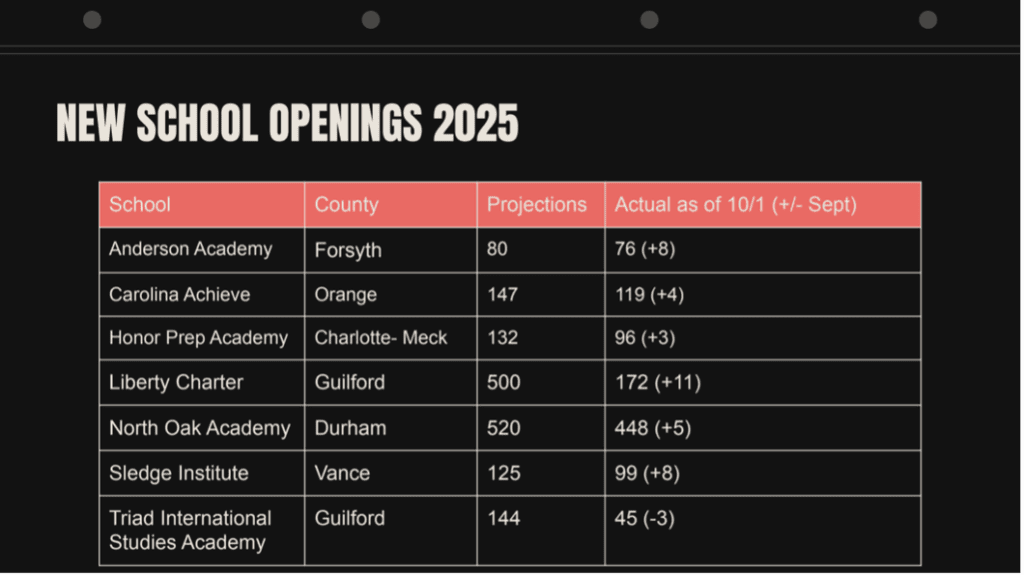
Applicant decisions
Prior to interviews, OCS shared an application update and recap of earlier decisions regarding 2025 applicants. Before this month, the CSRB had approved three applicants and denied one, with eight decisions pending.
Focus Academy’s interview this month was its second, and five board members appeared in person to answer questions. The school is a repeat applicant, having sought approval unsuccessfully in 2024.
During questioning last month, CSRB members were dissatisfied with leaders’ responses regarding the school’s relationship with charter management organization (CMO) American Traditional Academies.
This time, applicant answers and CSRB responses were notably different.
“We know that it’s not just about passion, as we talked about before,” said Sherria Grubbs, the Focus board chair. “There’s a business aspect to it that we want to make sure that we get right.”
CSRB members were pleased with how Focus Academy delineated its relationship with ATA in follow-up written questions. ATA’s role is “advisory and supportive,” with the school’s board and administration making decisions regarding education, governance, and personnel, Focus wrote.
The CSRB also commended school leaders on their responsiveness to input.
“I know it’s been painful in some places in this process, but I think you even see the evidence of your growth and understanding,” said CSRB member Rita Haire. “Last year, when we said, ‘Let’s try it another year and you can be accelerated,’ you did exactly what the board recommended.”
The school intends to serve K-8 students at capacity, according to the OCS snapshot. Focus will operate initially out of the former Word of God Christian Academy building in Raleigh, later moving to a facility in Garner.
CSRB members urged the school to target enrollment intensively.
“You’ve got to work tirelessly to get those enrollments. They’re not going to come to you because a school 10 miles down the road has a waiting list,” said Friend. “Never stop recruiting.”
As an accelerated charter, Focus will move immediately into the Ready to Open process.
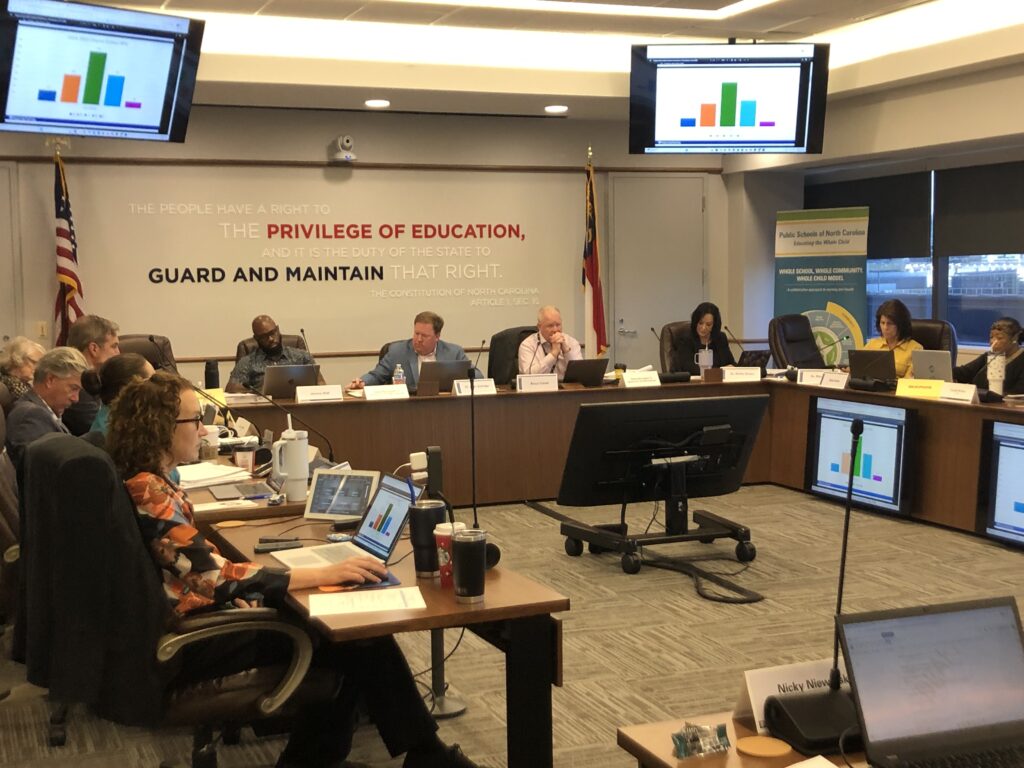
Two other applicants failed to win over the CSRB, with both submitting applications the board deemed insufficient.
Preparatory Leadership Academy (PLA) leaders shared their vision for a Gastonia charter school emphasizing social emotional learning, leadership development, community engagement, and more. According to the OCS snapshot, PLA expected to serve K-5 students at capacity.
School leaders cited low rates of reading proficiency in Gaston County as evidence their school was needed.
“We exist because we’re going to close that gap,” said Doris Sanders, PLA’s board chair. “We are more than a school. We are a catalyst for change and transformation.”
CSRB members expressed concern about overlap with Ridgeview Charter, which the CSRB voted to close in 2024. PLA’s address appeared to be the same, and former Ridgeview staff were involved in leadership.
PLA has since secured another location, Sanders said. She served as the assistant principal and in other roles at Ridgeview.
Another board member also worked at Ridgeview as a teacher but countered the notion that the schools would be similar. “We are not Ridgeview 2.0,” he said.
“The reason why you probably are getting questions about Ridgeview is it was one of the lowest performing schools that we had in the state at the time,” said Eldridge.
CSRB members also expressed concerns about PLA’s budget, limited evidence of community support, and inconsistencies in the application.
“Their operations budget is very sparse,” said CSRB member Shelly Shope.
“It looks like a first draft,” said CSRB member Jeremy Wall, noting that school programs were misaligned with PLA’s demographic and age group, and should be refined. “Right now, it definitely feels like we’re trying to do everything… and it’s going to end up being the same narrative as Ridgeview.”
The other applicant, Encompass Montessori, sought to operate as a K-5 school at capacity, according to the OCS snapshot. The school planned to partner with new CMO Epic Change Education for support. Epic was founded by Sherilyn Moore, who resigned recently as chief impact officer at Building Hope.
Several Encompass board members are also affiliated with the National Center for Montessori in the Public Sector, with one planning to step down to lead the school.
While the Montessori model and national connections were appealing to the CSRB, members had numerous questions about the school’s relationship with the CMO and the board’s overall lack of familiarity with its application.
“I feel like I need more confidence that the board knows what will happen if the relationship with the CMO doesn’t go the way you want,” said Friend.
CSRB members also expressed concern about the lack of evidence for local demand.
“Montessori is a wonderfully unique and innovative way of instruction,” said Haire. “But you haven’t given us any demonstration of community support or need or demand or interest at all. Just zero.”
Despite the denial this time around, CSRB members encouraged Encompass to try again.
“Because of the expertise that’s behind it and… also knowing the waiting list that we have for public Montessori charter schools and the value that they bring, I hope that you’ll come back and do fast track,” Kakadelis said.
Both applicants who were denied have the right to appeal to the State Board of Education.
New charter academic data
Brandi Gill of OCS shared 2024-25 data for 206 of 213 charter schools in a new academic report. Alternative charters or those with insufficient data were not included in the OCS report.
“The data represents a collective performance of our charter schools across the state, highlighting both achievements and areas for continued focus,” she said.
Here is the distribution of school performance grades:

According to OCS data, 30% of charter schools earned A or B grades, nearly 41% received C grades, and 29% earned D or F grades.
The number of charters earning an A grade has “rebounded significantly since 21-22, where there was a low of seven schools, and now there are 17 schools,” Gill said.
Here are the five-year comparisons:
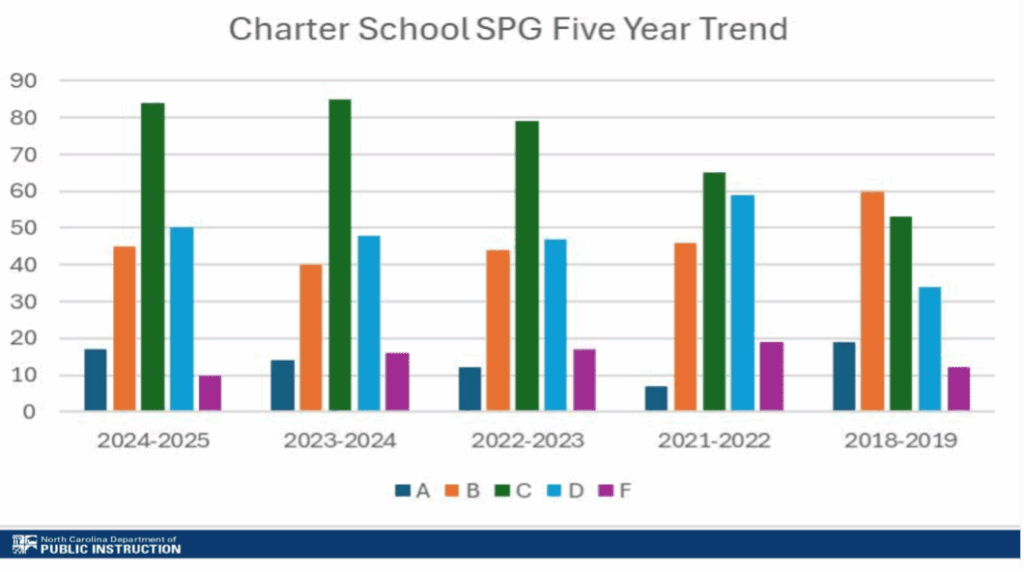
Gill also shared top 10 lists based on performance grades and growth.
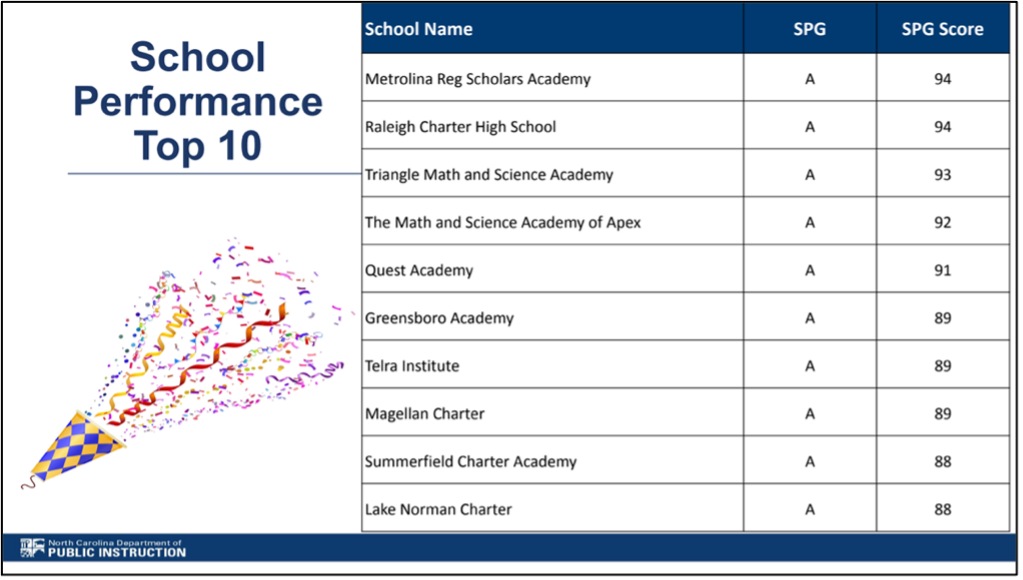
According to state data, a higher percentage of schools, 73%, met or exceeded growth in 2024-25, compared to 69% in 2018-19.
These are charters’ five-year growth trends:
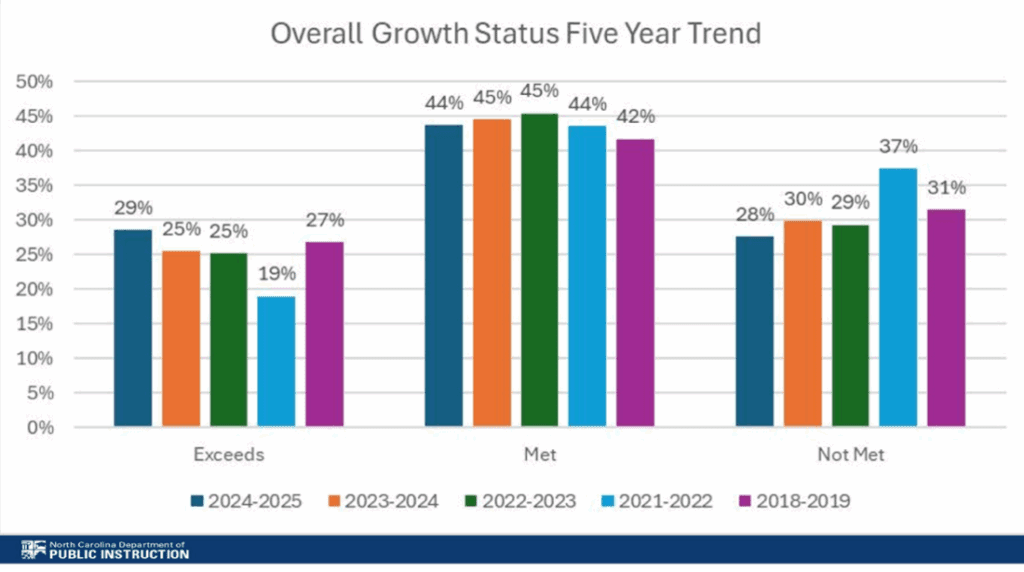
Here are the top 10 charters for growth:
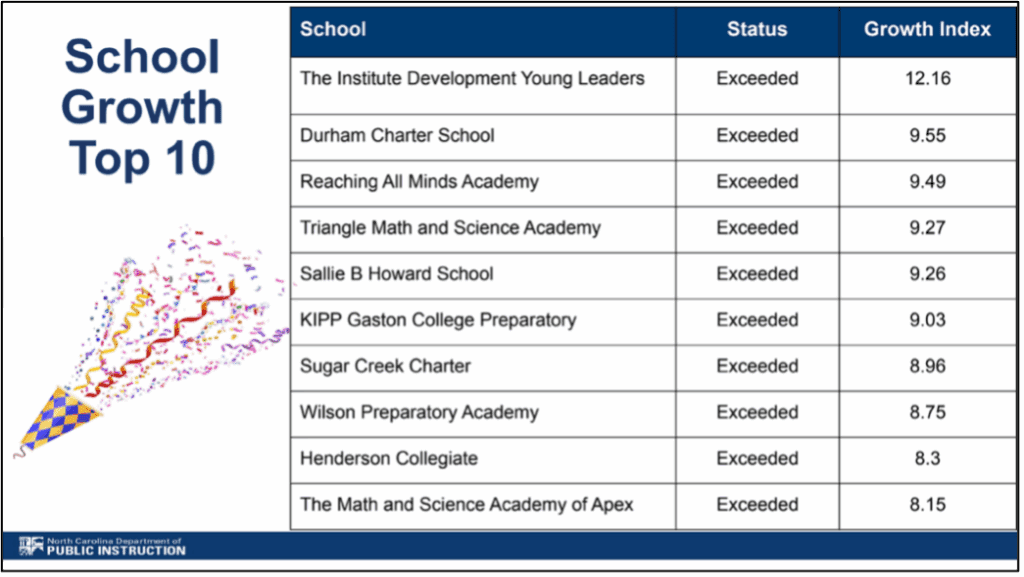
Gill shared a “special shout-out” to the Institute for the Development of Young Leaders, which reached “double digits on the growth index,” she said.
STEM-based schools are exhibiting strong math performance, she noted. In addition, “K-12 charter schools are demonstrating a sustained performance across multiple grade spans,” Gill said.
Eldridge pointed out that Triangle Math and Science Academy and TMSA Apex are A schools and are still exceeding growth “by strong numbers.”
CSRB member Eric Guckian also noted that several of the schools with outstanding growth serve high-need, low-income populations. “I think that’s telling as well, from a growth perspective,” he said.
Gill also shared data on struggling schools.
“Schools earning an F grade are the lowest in five years,” she said, with the number dropping from 18 schools in 2018-19 to 11 in 2024-25.
According to state designations, low performing (LP) schools have earned a school performance grade of D or F and growth status of either met or not met. Continually low performing (CLP) schools have been designated as low performing in two of the past three years.
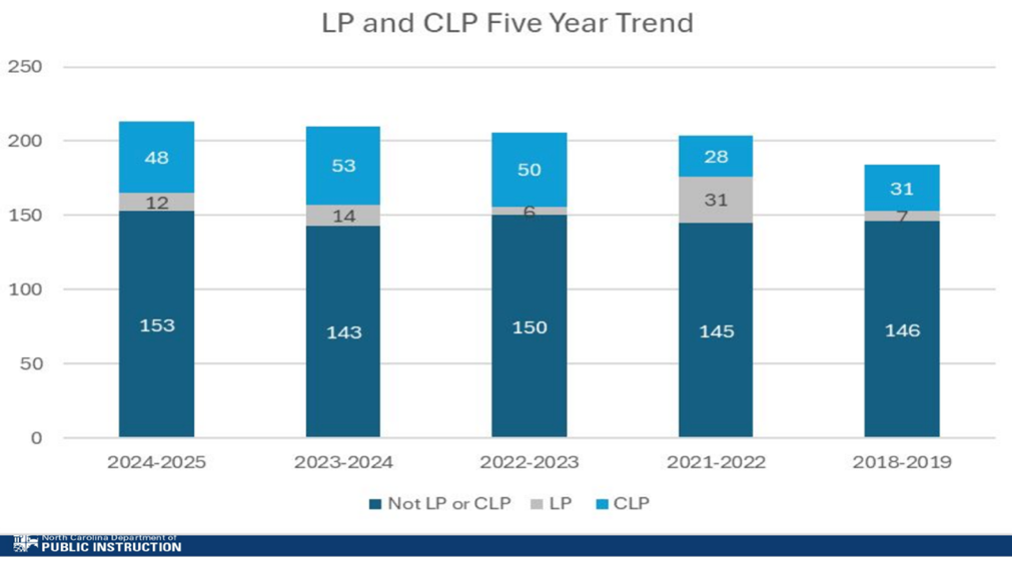
“Overall, the five-year trend shows LP and CLP schools are making progress in addressing performance challenges,” Gill said.
Other business
The CSRB also heard a renewal preview, outlining the process for the 40 schools in the 2026 renewal cohort. These schools, whose charters end in June 2026, will begin their presentations in November.
Here are the 2026 renewal schools:
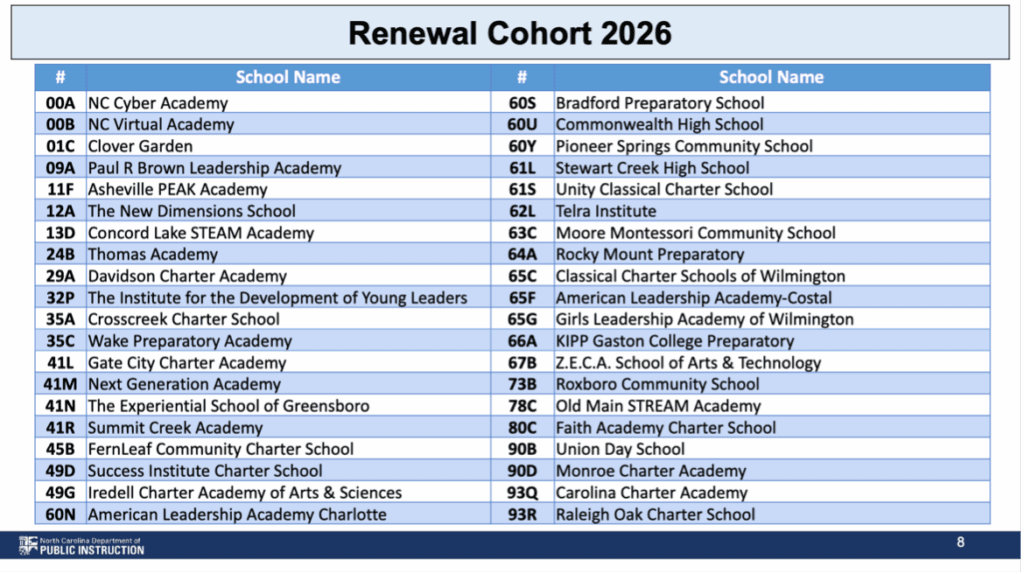
The CSRB will vote on renewals in January and February.
In addition, the CSRB approved a revised charter application for new applicants, the culmination of months of discussion, public comment, and intensive revision. CSRB members reviewed and discussed the application last spring, between March and May.
According to an OCS summary, the goal has been “to facilitate a transparent, understandable, and rigorous process that holds charter boards to high expectations resulting in quality charter schools.”
In the application, some questions have been consolidated, with other revisions providing clarification around important issues, such as enrollment, parent demand, or demographic projections. Questions pertaining to CMOs and EMOs (education management organizations) have also been updated, asking how boards will keep management companies accountable and more.
The approved 2026 application will roll out in January.
CSRB members also discussed draft guidelines for future sub-campus decisions, compiled during the Sept. 26 convening of a new CSRB sub-campus committee. The committee was formed following approval of a sub-campus request last month. Chaired by Eldridge and comprised of six other CSRB members, the committee sought to shape overarching guidelines while retaining flexibility to consider sub-campus requests individually, said Shope, a committee member.
“We are not tying our hands to anything from the get-go, other than you can’t be low performing,” she said.
The committee’s draft guidelines will be refined further and then voted on in November.
CSRB members also provided clarification this week around the “sub-campus” term.
“A sub-campus is not a new charter,” Friend said. Some media reports in September, he noted, said “a school got to open up a new charter in Durham bypassing the process.”
“No, they didn’t,” he said. “They opened up a facility that’s more than 10 miles away. It’s not a new charter.”
Finally, the CSRB approved two amendments: a mission statement update from Pine Lake Preparatory and a request from Wayne Preparatory Academy to join the National School Lunch Program.
The CSRB meets next Nov. 11-12.
Editor’s Note: EdNC has retained Kristen Blair to cover the monthly meetings of the Charter Schools Review Board in 2025. Kristen currently serves as the communications director for the North Carolina Coalition for Charter Schools. She has written for EdNC since 2015, and EdNC retains editorial control of the content.
Recommended reading
